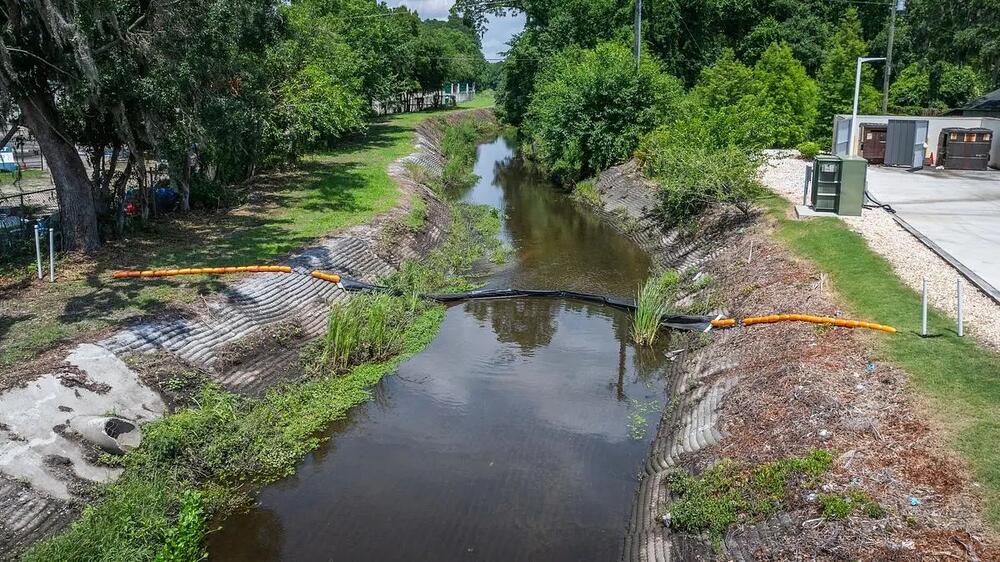
Caption
Trash traps installed in Thunderbolt by the Savannah Riverkeeper on May 28, 2025.
Credit: Justin Taylor/The Current GA/CatchLight Local
|Updated: June 20, 2025 9:24 AM
Almost 150 miles of canals crisscross Savannah. These manmade drainage systems abound with turtles, wading birds and fish, but they’re also often rife with trash. Styrofoam cups, plastic water bottles, and takeout boxes ride in on the runoff from streets and parking lots every time it rains.
Volunteers clean them out periodically, but litter returns with the next downpour. To provide a longer range solution, the Savannah Riverkeeper recently installed seven litter booms in strategic spots along the canals. There’s one more to come near the Enmarket Arena.
Those booms work passively. As water flows along the canal it carries litter with it until floating litter hits the boom and accumulates behind it. Two booms installed by the Ogeechee Riverkeeper have been quietly collecting trash on Savannah’s southside for several years.
Clöe Lemaire, the Savannah Reuse System Outreach Coordinator for the Savannah Riverkeeper, said her organization will arrange regular trash pickups at these booms.
“About once a month we’ll get out there,” she said, as she checked on a boom installed near the Truman Linear Park Trail at Skidaway Road. “We’ll grab all the trash out. We take about an hour to survey and sweep the trash along the banks as much as we can.”
Each time they clean out a boom they’ll sample the trash and categorize each piece.
“When there’s specific brand names that we can call out, we’ll list those as well, and then we also give it kind of a grade on how deteriorated it is depending on the type of material.”
From past experience, Lemaire anticipates cups from Parker’s, Enmarket and Chick-fil-A will top the list of branded flotsam in these waterways.
The resulting trash catalog will help the Riverkeeper target the next phase of its project, which focuses on reducing the volume of single-use plastics offered at Savannah restaurants and convenience stores. For that work, the Riverkeeper is teaming up with Perpetual, a nonprofit that aims to establish reusable foodware programs in cities including Savannah.
“Thinking about the data we pull from this, we’re going to be sharing it with the city, of course, sharing with the partners and the big brand names that we are identifying as kind of the top contributors,” Lemaire said. “And then we’re hoping to segue that conversation into good alternatives, like reusable cups, replacing all these single use water bottles and cups that we find in here.”
The project is funded by a three-year grant of about $560,000 from the National Oceanic and Atmospheric Administration Marine Debris Program. The Savannah Riverkeeper purchased the booms, including one that includes a gate to allow kayak passage, from an Alabama-based company, Osprey Initiative. The booms cost about $2,500 – $6,000 depending on their length.
Water-borne litter is not just an eyesore.
“From the stormwater perspective, it is clogging up all our storm water drains,” Lemaire said. “And we already have such an issue with flooding.”

Trash traps installed in Thunderbolt by the Savannah Riverkeeper on May 28, 2025.
And then there’s the litter’s final destination.
“All of these waterways have a connection to the Savannah River, which is why we were interested in this project as well,” Lemaire said. Along with the Savannah River, the Ogeechee also drains the area. Both waterways flow to the Atlantic Ocean. “That has the impact of choking wildlife, and just getting caught in propellers and other issues like that as well, just the physical damage.”
Plastics break down into tiny particles in the ocean. And those particles appear nearly everywhere, including coastal Georgia waters, as studies at UGA Skidaway Institute of Oceanography have shown.
“Plastics, of course, release these kinds of endocrine disrupting chemicals that we’re just beginning to understand,” Lemaire said. “I’m starting to dive into the plastic world, and it’s scary once you start realizing how much of it is around you, how much of it is not really avoidable right now, because we just don’t have solutions to plastic.”
Plastic production and use has surged worldwide this century. A 2017 paper coauthored by University of Georgia researcher Jenna Jambeck documented that plastic production in the 13 years prior to the study’s publication was equal to that produced in the previous half century. Studies have also shown rising levels of plastics in human brains and other tissues.
The Savannah Riverkeeper is partnering with the Ogeechee Riverkeeper and the City of Savannah to engage the community in the project, including recruiting volunteers to help with the monthly trash roundups at the litter booms. Initial boom cleanouts will probably get a hand from the Friends of Urban Nature group that already organizes canoeists and kayakers to cleanup waterways in the Savannah area, Lemaire said. Eventually, the Riverkeeper will recruit volunteers through its website and Facebook page.
Game cameras are being installed to keep tabs on the sites, especially during severe weather, including hurricanes.
“A lot of the sites, they get overflowed when it’s a really intense event like that, and you lose a lot of the trash,” Lemaire said. “So if you could at least get a visual capture of how much you’re losing, or figure out how it’s getting out, you can maybe address that a little bit.”
Because the booms float and have only a short curtain that hangs into the water, they allow wildlife to pass under them easily.
“From what I’ve heard anecdotally turtles love these things,” Lemaire said. “Turtles will be hanging out at them, and that just creates its own little ecosystem.”
For more information about this project, visit the Marine Debris Program Clearinghouse.
To learn about Savannah Riverkeeper’s pollution prevention efforts, read this web story.
This story comes to GPB through a reporting partnership with The Current.